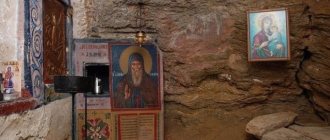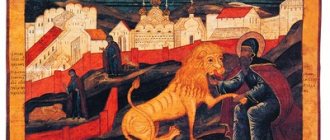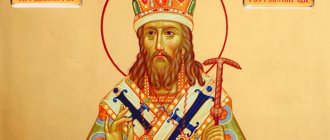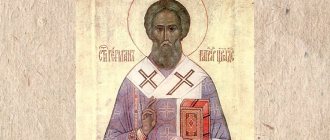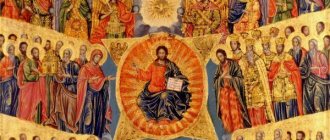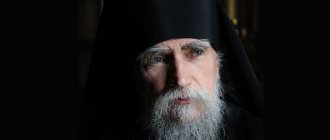Venerable Gerasim of Jordan
Brief life of St. Gerasim of Jordan
He was originally from the city of Lycia (Cappadocia, Asia Minor).
Already in his youth, he decided to leave worldly life and devote himself to serving God. Having accepted monasticism, he went to Egypt, to the Thebaid desert. Then, after many years, the saint came to Palestine and settled in the Jordan Desert. Here the Monk Gerasim established a monastery, the rules of which were distinguished by great severity. The abbot himself showed the brethren a wonderful example of perfect asceticism and abstinence. During Great Lent, the monk did not eat anything until the brightest day of the Resurrection of Christ, when he received communion of the Divine Mysteries. During the death of Saint Euthymius the Great († 473), it was revealed to the Monk Gerasim how the soul of the deceased was lifted up to heaven by Angels. The holy ascetic met a wounded lion in the desert and healed him. In gratitude, the lion began to serve the elder as a pet until his death, after which he himself died at the grave and was buried near the saint’s tomb. The Monk Gerasim peacefully departed to the Lord in 475.
Complete Life of St. Gerasim of Jordan
The Monk Gerasim was from Lycia (Asia Minor). From his youth he was distinguished by his piety. Having accepted monasticism, the monk withdrew deep into the Thebaid desert (Egypt). Around 450 the monk came to Palestine and settled near the Jordan, where he founded a monastery.
At one time the saint was tempted by the heresy of Eutyches and Dioscorus, who recognized in Jesus Christ only the Divine nature. However, the Monk Euthymius the Great (January 20) helped him return to the right faith.
The saint established strict rules in the monastery. The monk spent five days a week in solitude, doing handicrafts and prayer. On these days, the hermits did not eat boiled food and did not even light a fire, but ate dry bread, roots and water. On Saturday and Sunday everyone gathered at the monastery for the Divine Liturgy and received the Holy Mysteries of Christ. In the afternoon, taking with them a supply of bread, roots, water and an armful of date palm branches for weaving baskets, the hermits returned to their solitary cells. Each one had only old clothes and matting on which to sleep. When leaving the cell, the door was not locked, so that anyone who came could enter, rest or take what they needed.
The monk himself showed a high example of asceticism. During Great Lent, he did not eat anything until the brightest day of the Resurrection of Christ, when he received Holy Communion. Going into the desert for the entire Great Lent, the monk took with him Blessed Kyriakos, his beloved disciple (September 29), who was sent to him by the Monk Euthymius the Great.
During the death of Saint Euthymius the Great, it was revealed to the Monk Gerasim how the soul of the deceased was lifted up to heaven by Angels. Taking Kyriakos with him, the monk immediately went to the monastery of Saint Euthymius and buried his body.
The Monk Gerasim died peacefully, mourned by his brethren and disciples. Until his death, the Monk Gerasim was helped in his labors by a lion, which, after the elder’s death, died on his grave and was buried near the saint’s tomb. Therefore, the lion is depicted on icons at the feet of the saint.
See also: “ The Life of our Venerable Father Gerasim, who lived on the Jordan” as presented by St. Demetrius of Rostov.
Lion of Elder Gerasim
Home / Publications / Elegant style / Prose / The Lion of Elder Gerasim
Eastern legend
Three hundred years after Jesus Christ, there lived in the East a rich man named Gerasim. He had his own houses, gardens, more than a thousand slaves and slaves, and a lot of all kinds of jewelry. Gerasim thought: “I’m not afraid of anything,” but when he once became very ill and almost died, then he began to think differently, because he saw how short human life is and that diseases attack from everywhere, and no wealth can save you from death , and therefore, wouldn’t it be smarter to manage your wealth in advance so that it doesn’t get confused in old age, and then no one would quarrel over it?
Gerasim began to consult with different people on how best to do it. Some said one thing, and others another, but all this was not on Gerasim’s mind. Then one Christian said to him:
“You will do well if you do with your wealth as Jesus Christ advises: you set your slaves free and distribute your property to those who suffer from poverty.” When you do this, you will be calm.
Gerasim obeyed - he became a Christian and distributed all his wealth to the poor, but soon saw that, in addition to those whom he had endowed, there were still many poor people to whom he could no longer give anything, and these began to reproach him for not knowing how to divide your wealth so that there is enough for everyone.
Gerasim was upset: he was sad that some scolded him, and others laughed at him, that he had previously lived enough, but now, having given away everything, he himself was in poverty, and had offended all the heirs, but still did not correct all the beggars.
This made Gerasim very embarrassed, and in order not to suffer annoyances from his heirs, Gerasim got up and left the crowded place into the desert. And the desert was wild, where not a single person lived, but only animals prowled and snakes crawled.
Gerasim walked through the hot desert and felt that he felt better here. It’s deaf and scary here, but his heirs don’t scold or curse him, and no one laughs at him or condemns him for doing this and not that way. And he himself is calm, because he acted according to the word of Christ: “Give up everything and follow Me,” and there is nothing more to worry about.
Gerasim found a hole under a chalk stone, dragged reeds there and began to live here.
Life was quiet for Gerasim, but there was nothing to eat or drink. He had difficulty finding some edible roots, and went to the stream for water. The spring of water was far from the cave, and by the time Gerasim got drunk and went back to his hole, he would be scorched all over again; and he is afraid of animals, and his strength is weakening, and he wants to drink again. And closer, near the water, there is no place where you can hide.
“Well,” Gerasim thinks once in great heat, “I can’t bear this torment: if you crawl out of my chalk hole, you have to burn in the sun; and here, without water, I must die of thirst, and I have neither a jug, nor a pumpkin, nor any other utensils to carry water. What should I do? “I’ll go,” Gerasim thinks, “for the last time to the spring, get drunk and die there.”
With this decision, Gerasim went to the water and saw footprints in the sand - as if a caravan on donkeys and camels had passed here... He looked further and saw that there was one camel lying there, torn to pieces by a beast, and not far from it was lying still alive, but only very weakened , the donkey sighs heavily, twitches its little legs, and wets its lips.
Gerasim left the lifeless camel lying around, and thought about the donkey: “This one can still live. He was only thirsty because the caravanners did not know where to find water. Before I die myself, I will try to alleviate the suffering of this poor animal.”
Gerasim lifted the donkey to his feet, hooked it under the belly with his belt and began dragging it, and dragged it to the spring of fresh water. Then he wiped the donkey’s caked muzzle with a wet palm and began to drink it from his hands so that he would not immediately become drunk.
The donkey came to life and stood up.
Gerasim felt sorry to leave him here, and he took him to his place, and thought: “If I suffer with him some more, I will do him some good.”
They went back together, and meanwhile the huge camel was almost completely eaten; and to one side lay a large rag of his skin. Gerasim went to take this skin to carry water in it, but saw that behind the camel lay a large yellow lion with a mane - it was lying around from satiety and slapping its tail on the ground.
Gerasim thought: “Well, this must be my end: this lion will probably jump up and tear both me and the donkey to pieces.” But the lion did not touch them, and Gerasim safely took with him a rag of camel skin to make a bag out of it into which to pour water.
Gerasim also picked up sharp branches along the way and made a little fence out of them for the donkey, right next to his hole. “Here he will feel fresh and calm at night,” the elder thought, but he didn’t guess right.
As soon as it got dark in the yard, suddenly something seemed to fall from the sky above the cave, and a terrible roar and donkey cry were heard.
Gerasim looked out and saw that the previous terrible lion had shaken his first satiety and came to eat his donkey, but he failed: having taken a running jump, the lion did not notice the fence and stuck a sharp branch into his groin and roared in unbearable pain.
Gerasim jumped out and began to remove sharp knitting needles from the animal’s wound.
The lion was shaking all over in pain and roared terribly and tried to grab Gerasim by the hand, but Gerasim was not afraid of him and pulled out all the thorns, and then he took the camel skin, put it on a donkey and drove it to the spring for fresh water. There, at the spring, he tied the skin with a bag, filled it with water and went back to his hole.
The lion did not move from his place all this time, because his wounds hurt terribly. Gerasim began to wash the lion’s wounds, and he himself brought a handful of water to his gaping mouth, and the lion lapped it up from the palm of his hand with his sore tongue, but Gerasim was not afraid, so he was surprised at himself. The same thing was repeated the next day and the third, the lion felt better, and on the fourth day, when Gerasim and the donkey went to the spring, he saw that the lion stood up and also trudged after them.
Gerasim put his hand on the lion's head, and so the three walked side by side: the old man, the lion and the foal.
At the spring, the old man, with his free hand, washed the lion’s wounds in free water, and the lion was completely refreshed, and when Gerasim went back, the lion followed him again.
The old man began to live with his animals.
The old man grew pumpkins, he began to dry them and make jugs out of them, and then began to take these jugs to the source so that they would be suitable for those who had nothing to take water with them. This is how Gerasim lived and fed himself, and because of his strength he was useful to other people. And the lion also found a service for himself: when Gerasim was resting in the heat of the day, the lion guarded his donkey. They lived like this for a fair amount of time, and there was no one to be surprised at them, but once travelers passing by in a caravan saw this company and told about them in residential places along the roads, and now curious people began to come from different places: everyone wanted to see how the poor old man lived and with him is a donkey and a lion, who does not torment them. Everyone began to be surprised at this and asked Gerasim:
- Tell us, please, by what force are you doing this? It’s true, you are not an ordinary person, but an extraordinary one, that Isaac’s miracle happens in your presence: the lion lies next to the donkey.
And Gerasim answered:
- No, I’m a very ordinary person, and I’ll even admit to you that I’m still very stupid: I live with animals, but I didn’t know how to live with people at all - they all took offense at me, and I left the city for the desert.
- How did you offend?
“I wanted to divide my wealth among everyone so that everyone would be happy, but instead they all quarreled.”
- Why didn’t you make them smarter?
- Yes, that’s exactly what it is, that it’s difficult to equal those who themselves are not equal; I made the mistake of taking a lot for myself at first. If I didn’t have to take anything unnecessary for myself against others, it would be peaceful.
People nodded their heads.
- Hey! - they said, - yes, he is a foolish old man, and yet it is still surprising that his lion is guarding his donkey and will not eat them both. Let's live with him for a few days and see how it works out for them.
Three people remained with them.
Gerasim did not drive them away, he only said:
“We need to live together not in such a way that three people look after one, but we all need to work, otherwise disagreement will come, and then I’ll get scared of you and leave.”
The three agreed, but the next day a disaster happened to them: while they were sleeping, the lion also fell asleep and did not hear how the robbers passing by in a caravan threw a noose around the donkey and took him away with them.
In the morning people woke up and saw: the lion was sleeping, but there was no sign of the donkey. Three and they say to Elder Gerasim:
- So you really got what you should have long ago: the beast will always be a beast, get up quickly - your lion finally ate your donkey and, probably, buried its bones somewhere in the sand. Gerasim crawled out of his chalk hole and saw that the matter was similar to what the three told him. The old man was upset, but did not argue, but took on the camel’s fur and went to fetch water. He walks, steps heavily, and looks - his lion is trailing behind him in the distance; his tail dropped to the ground and his head hung down.
“Maybe he wants to eat me too? - thought the old man. - But does it matter to me how I die? I will act better according to God’s covenant and will not become a slave to fear.”
And he came and went down to the spring and drew water, and when he stood up, he saw the lion standing in the very place where the donkey always stood while the old man put a skin of water on his back. Gerasim put a bottle of water on the lion’s back and sat on it himself and said:
- Carry it, you're guilty.
The lion carried the water and the old man, and when the three strangers saw that Gerasim was riding on a lion, they were even more amazed. One remained here, and two of them immediately ran to a residential area and returned with many people. Everyone wanted to see how the ferocious lion carried a bottle of water and a decrepit old man.
Many came and began to say to Gerasim:
– Confess to us: are you either a wizard, or do you have a special power that other people don’t have?
“No,” answered Gerasim, “I am a completely ordinary person, and the strength in me is the same as all of you.” If you want, you can all do it.
– How can this be achieved?
- Treat everyone kindly and kindly.
- How can you be kind to someone who is fierce? He will destroy.
- What a tragedy, don’t think about it and don’t be afraid for yourself.
- How can you not be afraid for yourself?
- But just like you are sitting with me now and you are not afraid of my lion.
- This is because we are bold here because you are with us.
- Nonsense - what protection am I from the lion?
“You know the remedy for the beast and will stand up for us.”
And Gerasim answered again:
“It’s nonsense that you made up your mind that I seem to know a remedy for a lion.” God gave me His goodness in order to overcome the fear in myself - I caressed the beast, and now it does no harm to me. Sleep, don't be afraid.
Everyone went to sleep around Gerasim’s chalk hole, and the lion lay down right there, and when they got up in the morning, they saw that the lion was not in his place!.. Either someone scared him away, or killed him and buried his corpse at night.
Everyone was very confused, and Elder Gerasim said:
- It’s okay, he went right to business and will return.
They talk like this and see that in the desert a column of dust has suddenly lit up and in this sun-pierced dust strange monsters with humps and wings are flying: one rises up, and the other falls down, and it all rushes about, and it all knocks and rattles, and rushes straight towards Gerasim, and at once everything fell and fell like a ring around everyone standing; and behind, an old lion beats the ground with its tail.
When they looked around, they saw that it was a string of huge camels, all tied to each other, and in front of them all was Gerasimov’s loaded donkey.
-What happened and how did it happen?
And this was the case: a merchant caravan was walking through the desert; He was attacked by robbers who had earlier stolen Gerasimov’s donkey. The robbers killed all the merchants, and took the camels with goods and went to share. They tied the donkey to the very rear of the camel. The lion sensed in the wind where the donkey was going and rushed to catch up with the robbers. He overtook them, grabbed the rope with which the camels were tied, and began to gallop,” and the camels jumped out of fear of him and threw up the donkey. So the lion drove the entire caravan to the old man, and the robbers all fell off their saddles, because the frightened camels jumped very hard and it was impossible to hold on to them. The lion himself was bleeding because an arrow was shooting at his shoulder. All the people clasped their hands and shouted:
- Ah, Elder Gerasim! Your lion has an amazing mind!
“My lion has a bad mind,” the elder answered, smiling, “he brought me something that I don’t need at all!” These camels carry goods of great price. This is fire! I beg you, let someone mount my donkey and lead these frightened camels to the high road. There, I am sure, their distressed owners are now sitting. Give them all their wealth and my donkey in addition, and I will lead my lion to the water and there I will try to remove the arrow from his wound.
And half the people went to take the camels away, while the others stayed with Gerasim and his lion and saw how Gerasim spent a long time pulling and removing the jagged edge from the beast’s shoulder.
When those who had withdrawn the caravan returned, another middle-aged man came with them, in a magnificent outfit and with many weapons, and, seeing Gerasim, from afar he threw himself at his feet.
- Do you know who I am? - he said.
“I know,” answered Gerasim, “you are an unfortunate poor man.”
- I am the terrible robber Amru!
- You're not scary to me.
“They tremble me in the cities and in the desert - I killed many people, I took away a lot of wealth, and suddenly your amazing lion immediately rushed off our entire caravan.”
“He’s a beast, and that’s why he takes away.”
- Yes, but you returned everything to us and sent us your donkey in addition... Take at least one tent from me and pitch it wherever you want, closer to the water, for your peace.
“No need,” answered the elder.
- From what? Why are you so proud?
“I’m not proud, but the tent is too good and can arouse envy, and I won’t be able to share it with everyone without offense, and I’ll see the unevenness again, and I’ll become afraid.” Then my lion will leave me, and another greedy beast will come to me and again bring with it anxiety, envy, division, and reproaches. No, I don’t want your cool tents, I want to live without fear.
Temptation of Saint Gerasimos
Before the formation of the Lavra, during the ascetic’s stay in Palestine, the Fourth Ecumenical Council took place in Chalcedon, within the framework of which the church fathers judged Archimandrite Eutyches and Patriarch Dioscorus of Alexandria. The reason for this was the fact that these clergy fell into wickedness, defending the correctness of the judgment about the only nature of Jesus Christ - Divine. The council called the patriarch and archimandrite heretics. However, this was not the end of the matter. After some time, some wicked people rebelled, having a similar point of view regarding the Divine nature of the Son of the Lord. The main troublemaker turned out to be a certain Theodosius, a monk.
He began to spread his teaching among people and eventually confused not only the common people, but even Queen Eudokia and the ascetics of piety, among whom was Saint Gerasimos of Jordan. But soon the chosen one of God withdrew into the desert, following the example of other holy fathers, and especially the pious Euthymius.
Gerasim turned directly to the indicated ascetic and after his intelligible speeches he realized his mistake, repented and again began to profess Christianity. Gradually, all of Palestine was cleared of heresy, and people seemed to wake up from a heavy sleep and began to lead their former virtuous life.
Winged Lion of St. Mark
Apostle Mark of the Seventy is the author of one of the canonical gospels. His life of Christ is traditionally called a book written especially for the pagans. This gospel contains fewer Old Testament references than Matthew and Luke and more notes intended for converts. Mark is also the first bishop of Alexandria. The pagans of Alexandria, dissatisfied with Christian preaching, killed the apostle in 68 AD. e.
Venetian tradition claims that the northeast of modern Italy (the land of the Veneti) was also converted to Christianity by Mark, who made his disciple Hermagorus the first bishop of Aquileia. During the era of the Roman Empire, Aquileia was the largest city on the coast of the Gulf of Trieste, and after its destruction by barbarians, some of the city’s inhabitants founded Venice. Having left the coast, they settled on the islands located in the lagoon, on which the future capital of the medieval republic grew. Geographical isolation from the rest of Italy allowed the future “Queen of the Seas” to safely survive the shocks of the Dark Ages.
Saint Mark. Source: wikimedia.org
According to legend, one day the ship of St. Mark, returning from Aquileia to Rome, fell into a storm in the lagoon, and an angel who appeared to him announced that the body of the evangelist would rest in these places in the future. This legend was very useful to the Venetian doges in the 9th century, when the city gained de facto independence. This happened after the war with the Frankish Empire. In 809, Charlemagne's son and King of Italy Pepin attempted to besiege Venice, but was defeated and forced to retreat. The city remained outside the zone of influence of the Franks and the future Holy Roman Empire. According to the agreement between the Frankish Empire and Byzantium, Venice was recognized as part of Byzantium, but in fact it turned out to be independent. Further connections with Constantinople only benefited the republic, as it acquired many trading privileges that other Western merchants were deprived of.
Siege of Venice by Pepin. Source: wikipedia.org
So, the 9th century is the beginning of the glorious history of Venice, when kings and emperors began to reckon with it. In addition to winning the war and profitable trade, it was possible to consolidate the status of an important political center of Europe with the help of a noticeable religious and symbolic gesture. It was made in 828 - during the reign of Doge Giustiniano Partecipazio, the son of Agnello Partecipazio, who led the Venetian resistance to Pepin of Italy. The city then took possession of a sacred Christian relic - the relics of the Evangelist Mark.
In fact, the relics were simply stolen. Two Venetian merchants, Buono and Rustico, arrived in Muslim Alexandria, enlisted the help of local Greek monks and loaded the remains onto their ship. When the Saracens arrived in the bay with a search, they covered the loot with pork carcasses. Pious Muslims did not dare to touch the meat of an unclean animal and hastened to get away from the ship. The trick worked, and the ship left the harbor safely. Moreover, it is believed that during the voyage the spirit of St. Mark woke up the sleeping captain, advised him to lower the sail and prevented the ship from crashing on the reef.
Perhaps the expedition was organized by personal order of the Doge. But even if the relics ended up in Venice on the initiative of overzealous merchants, the appearance of the relic in the city still became a turning point in its history. Giustiniano Partechipazio ordered the construction of the Church of St. Mark, where the relics were transferred. This first basilica stood until 976. It was damaged by a fire that started during a palace coup. In the 11th century, the Venetians built a new church, which stands in Piazza San Marco to this day. It was consecrated in 1094.
When the first temple burned down, the relics of St. Mark disappeared without a trace. With the advent of the new basilica, a three-day fast was declared in the city. All Venetians, from ordinary residents to the Doge and nobles, prayed for the return of the relics. On the third day, during mass, part of the stonework collapsed near the temple, and in the resulting hole, eyewitnesses joyfully saw the lost relics. The relic was solemnly reburied. The temple itself became a symbol of Venetian power. The luxurious building most clearly demonstrated the wealth of the trading empire. Doge Domenico Selvo even ordered every Venetian merchant trading in the East to bring carved decorations and marble for the construction of the century. The cathedral was made in the Byzantine style. His magnificent mosaics also tell about the theft of relics from Alexandria.
Theft of relics. Source: wikipedia.org
If Saint Mark is considered the patron saint of Venice, then the winged lion became its symbol. The image of this beast is rooted in the Old Testament. In the book of the prophet Ezekiel, a tetramorph appears - a creature with four faces: a man, a lion, a bull and an eagle. In the Apocalypse of John they also appear as apocalyptic creatures. Later, Christian theologians associated the four winged images with the evangelists. Matthew is an angel, Mark is a lion, Luke is a calf, John is an eagle. Mark was paired with a lion because at the beginning of the gospel he describes the desert.
The Venetians depicted a winged lion on their banners and carved them on bastions and ships. The lion holds a book on which is written: "Pax tibi, Marce, evangelista meus." It was with these words (“Peace be with you, Mark, my evangelist”) that an angel addressed the evangelist in a vision during a storm in the place where Venice would later be founded.
Winged lion. Source: wikipedia.org
Believers of the republic were the first to remember Mark in their prayers. Soldiers and sailors shouted his name as they entered battle. During the heyday of the medieval state, Cyprus and Crete were under the wing of the apostolic lion.
In 1797, Venice was occupied by foreign troops for the first time in its thousand-year history. It was the French army - the day before Napoleon declared war on the republic. The treasury of St. Mark was sent in parts to Paris, and most of the stone winged lions that were seen here and there on the streets of the city were destroyed. Along with the fantastic beast, independence also disappeared - soon Venice was annexed to Austria.
